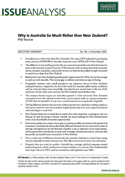
- Australians are a third richer than New Zealanders. Per capita GDP (adjusted for purchasing power parity) is NZ$48,000 in Australia compared to just NZ$36,400 in New Zealand.
- This difference is remarkable given that the two countries enjoyed the same level of income for most of the twentieth century. From the 1970s onwards, both countries were hit by economic shocks, recession, bad policy, and painful reforms, yet Australia has pulled through this period in much better shape than New Zealand.
- Reforms have seen New Zealand’s growth greatly improve since the 1990s, but not fast enough to catch up with Australia. The income gap is stubborn and shows no sign of closing.
- Geographic isolation and a small population are important factors in New Zealand’s underperformance compared to the rest of the world, but Australia suffers similar conditions and has overcome them more successfully. Australia has not moved closer to the rest of the world over the last thirty years, and nor has New Zealand moved further away.
- The resource boom’s impact on Australian growth is often overrated. New Zealand’s commodities have also enjoyed record returns, and its exports make up a greater proportion of GDP than do Australia’s. In any event, natural resources are no guarantee of growth.
- The big difference between the countries is labour productivity. Australian workers produce a third more wealth for every hour worked, largely because they have more capital (machinery and technology) to work with.
- New Zealand firms have invested less in capital than their Australian counterparts, but not because of a lack of savings or finance. Instead, the major challenge for New Zealand seems to be a lack of profitable investment opportunities.
- Government policy has a major role to play in creating a healthy environment for growth and investment. International surveys show little difference between the two countries in terms of red tape and regulation, but the direction of policy is just as important as the static picture. Ad hoc government interference in areas such as energy, telecommunications, and asset sales has greatly increased investor uncertainty in New Zealand.
- Tax is a major area of difference between the two countries. Australia is a much lower taxing country, especially in terms of income tax. This affects incentives to work, save, and invest.
- Prosperity does not come by accident. Australia has a stronger political consensus around policies for growth, which contributes to investor confidence. In contrast, New Zealand halted most major reform in 1993, and has increased tax and regulation since 2000.
Phil Rennie is a Policy Analyst with the New Zealand Policy Unit of The Centre for Independent Studies.
